1
Each religion makes scores of purportedly factual assertions about everything from the creation of the universe to the afterlife. But on what grounds can believers presume to know that these assertions are true? The reasons they give are various, but the ultimate justification for most religious people’s beliefs is a simple one: we believe what we believe because our holy scriptures say so. But how, then, do we know that our holy scriptures are factually accurate? Because the scriptures themselves say so. Theologians specialize in weaving elaborate webs of verbiage to avoid saying anything quite so bluntly, but this gem of circular reasoning really is the epistemological bottom line on which all 'faith' is grounded. In the words of Pope John Paul II: 'By the authority of his absolute transcendence, God who makes himself known is also the source of the credibility of what he reveals.' It goes without saying that this begs the question of whether the texts at issue really were authored or inspired by God, and on what grounds one knows this. 'Faith' is not in fact a rejection of reason, but simply a lazy acceptance of bad reasons. 'Faith' is the pseudo-justification that some people trot out when they want to make claims without the necessary evidence. But of course we never apply these lax standards of evidence to the claims made in the other fellow’s holy scriptures: when it comes to religions other than one’s own, religious people are as rational as everyone else. Only our own religion, whatever it may be, seems to merit some special dispensation from the general standards of evidence. And here, it seems to me, is the crux of the conflict between religion and science. Not the religious rejection of specific scientific theories (be it heliocentrism in the 17th century or evolutionary biology today); over time most religions do find some way to make peace with well-established science. Rather, the scientific worldview and the religious worldview come into conflict over a far more fundamental question: namely, what constitutes evidence. Science relies on publicly reproducible sense experience (that is, experiments and observations) combined with rational reflection on those empirical observations. Religious people acknowledge the validity of that method, but then claim to be in the possession of additional methods for obtaining reliable knowledge of factual matters – methods that go beyond the mere assessment of empirical evidence – such as intuition, revelation, or the reliance on sacred texts. But the trouble is this: What good reason do we have to believe that such methods work, in the sense of steering us systematically (even if not invariably) towards true beliefs rather than towards false ones? At least in the domains where we have been able to test these methods – astronomy, geology and history, for instance – they have not proven terribly reliable. Why should we expect them to work any better when we apply them to problems that are even more difficult, such as the fundamental nature of the universe? Last but not least, these non-empirical methods suffer from an insuperable logical problem: What should we do when different people’s intuitions or revelations conflict? How can we know which of the many purportedly sacred texts – whose assertions frequently contradict one another – are in fact sacred?.Alan Sokal
2
Faith in the possibilities of continued and rigorous inquiry does not limit access to truth to any channel or scheme of things. It does not first say that truth is universal and then add there is but one road to it.John Dewey
3
In our country religion is not different from philosophy and religion & philosophy don’t differ from science.Virchand Gandhi
4
It is the natural tendency of the ignorant to believe what is not true. In order to overcome that tendency it is not sufficient to exhibit the true; it is also necessary to expose and denounce the false. To admit that the false has any standing in court, that it ought to be handled gently because millions of morons cherish it and thousands of quacks make their livings propagating it–to admit this, as the more fatuous of the reconcilers of science and religion inevitably do, is to abandon a just cause to its enemies, cravenly and without excuse.H.l. Mencken
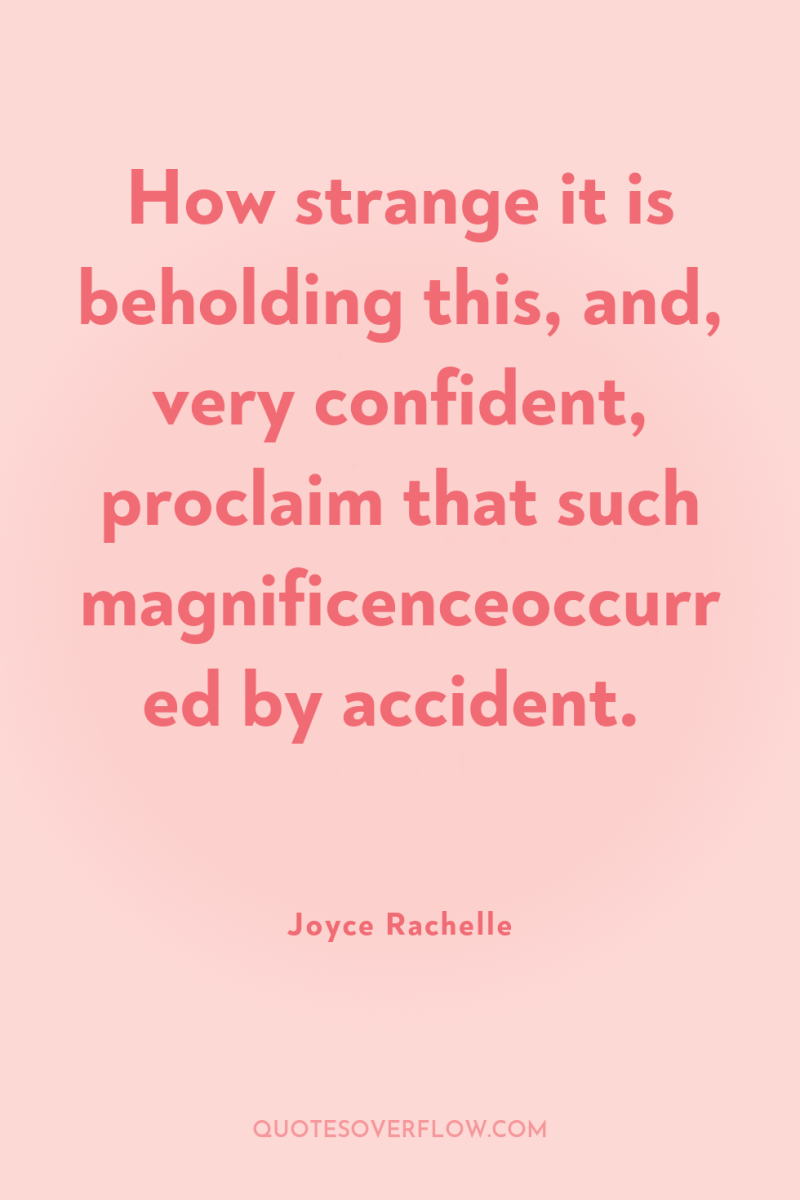
5
How strange it is beholding this, and, very confident, proclaim that such magnificenceoccurred by accident.Joyce Rachelle
6
Ignorance is hardly unusual, Miss Davar. The longer I live, the more I come to realize that it is the natural state of the human mind. There are many who will strive to defend its sanctity and then expect you to be impressed with their efforts.Brandon Sanderson
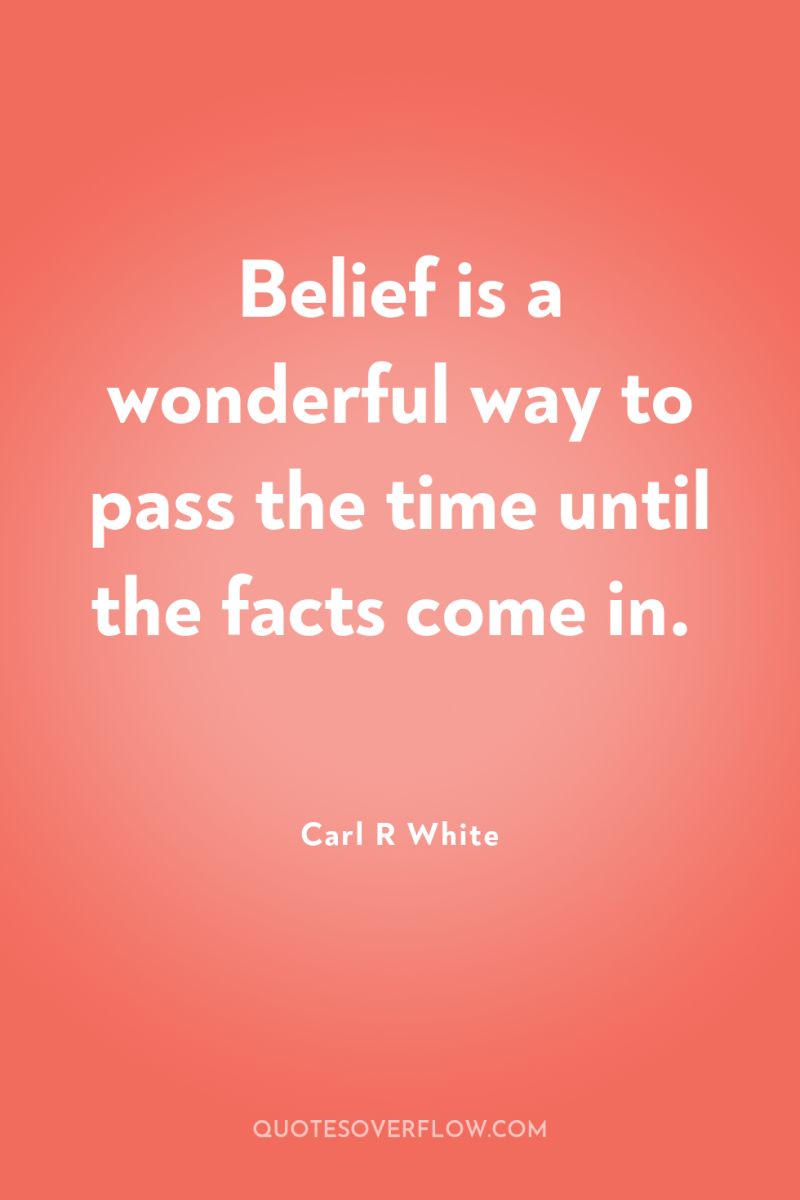
7
Belief is a wonderful way to pass the time until the facts come in.Carl R White
8
Note, to-day, an instructive, curious spectacle and conflict. Science, (twin, in its fields, of Democracy in its)– Science, testing absolutely all thoughts, all works, has already burst well upon the world–a sun, mounting, most illuminating, most glorious–surely never again to set. But against it, deeply entrench'd, holding possession, yet remains, (not only through the churches and schools, but by imaginative literature, and unregenerate poetry, ) the fossil theology of the mythic-materialistic, superstitious, untaught and credulous, fable-loving, primitive ages of humanity.Walt Whitman
9
The will to believe has given us our great saints. The will to doubt has given us our great scientists. The goal of the intelligent man is a character in which the will to believe of the saint and the will to doubt of the scientist meet and mingle.Glenn Frank
10
Science is not only compatible with spirituality; it is a profound source of spirituality. When we recognize our place in an immensity of lightâ€years and in the passage of ages, when we grasp the intricacy, beauty, and subtlety of life, then that soaring feeling, that sense of elation and humility combined, is surely spiritual. So are our emotions in the presence of great art or music or literature, or acts of exemplary selfless courage such as those of Mohandas Gandhi or Martin Luther King, Jr. The notion that science and spirituality are somehow mutually exclusive does a disservice to both. .Carl Sagan
11
Imagine for a moment that we are nothing but the product of billions of years of molecules coming together and ratcheting up through natural selection, that we are composed only of highways of fluids and chemicals sliding along roadways within billions of dancing cells, that trillions of synaptic conversations hum in parallel, that this vast egglike fabric of micron-thin circuitry runs algorithms undreamt of in modern science, and that these neural programs give rise to our decision making, loves, desires, fears, and aspirations. To me, that understanding would be a numinous experience, better than anything ever proposed in anyone's holy text.David Eagleman
12
..Turn our thoughts, in the next place, to the characters of learned men. The priesthood have, in all ancient nations, nearly monopolized learning. Read over again all the accounts we have of Hindoos, Chaldeans, Persians, Greeks, Romans, Celts, Teutons, we shall find that priests had all the knowledge, and really governed all mankind. Examine Mahometanism, trace Christianity from its first promulgation; knowledge has been almost exclusively confined to the clergy. And, even since the Reformation, when or where has existed a Protestant or dissenting sect who would tolerate a free inquiry? The blackest billingsgate, the most ungentlemanly insolence, the most yahooish brutality is patiently endured, countenanced, propagated, and applauded. But touch a solemn truth in collision with a dogma of a sect, though capable of the clearest proof, and you will soon find you have disturbed a nest, and the hornets will swarm about your legs and hands, and fly into your face and eyes.] .John Adams
13
Science works through replication, rectification and modification. But when it comes to religion, people simply tend to accept the theoretical preachers and their claims of historical God experiences without a single question. If there has been one experience in this world in any branch of knowledge, it absolutely follows that that experience will be repeated eternally. If they are not repeated through natural processes, the thinking humanity would have no way but to disprove that such an experience ever occurred in the history. .Abhijit Naskar
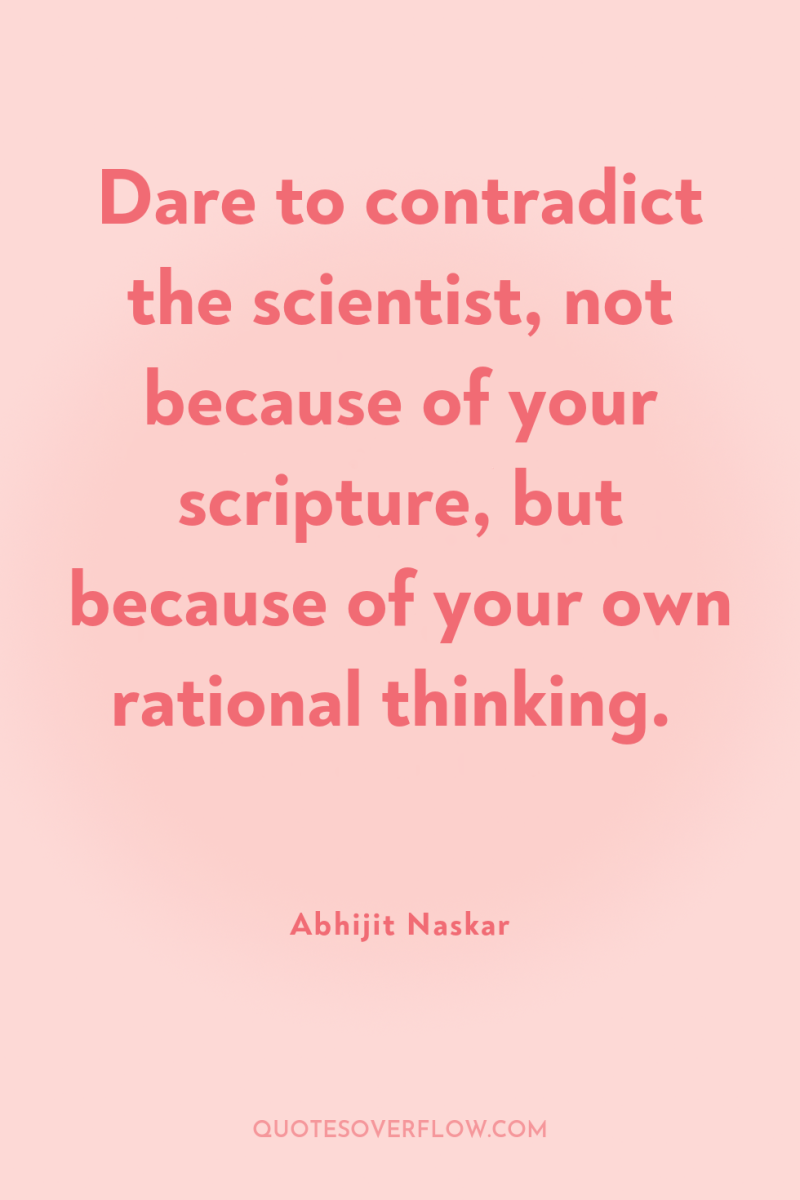
14
Dare to contradict the scientist, not because of your scripture, but because of your own rational thinking.Abhijit Naskar
15
Extinguished theologians lie about the cradle of every science as the strangled snakes beside that of Hercules; and history records that whenever science and orthodoxy have been fairly opposed, the latter has been forced to retire from the lists, bleeding and crushed if not annihilated; scotched, if not slain.Thomas Henry Huxley
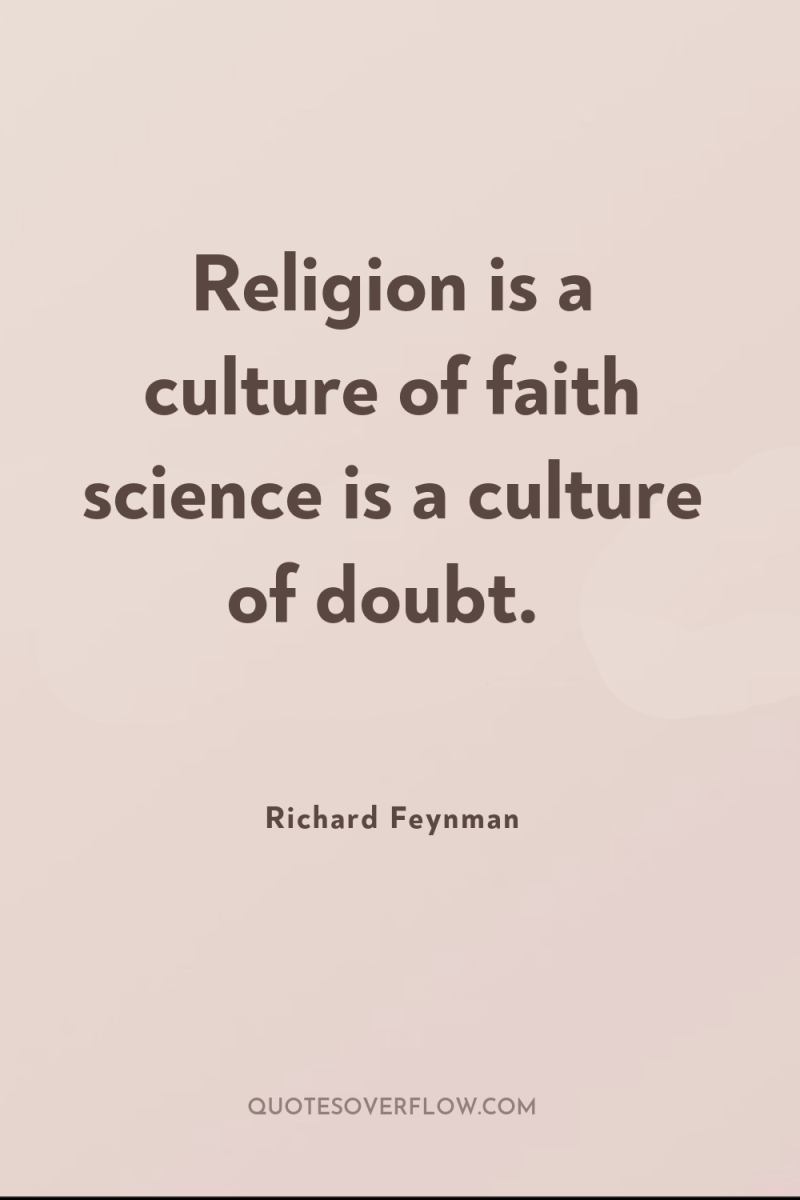
16
Religion is a culture of faith science is a culture of doubt.Richard Feynman
17
Ann Druyan suggests an experiment: Look back again at the pale blue dot of the preceding chapter. Take a good long look at it. Stare at the dot for any length of time and then try to convince yourself that God created the whole Universe for one of the 10 million or so species of life that inhabit that speck of dust. Now take it a step further: Imagine that everything was made just for a single shade of that species, or gender, or ethnic or religious subdivision. If this doesn’t strike you as unlikely, pick another dot. Imagine it to be inhabited by a different form of intelligent life. They, too, cherish the notion of a God who has created everything for their benefit. How seriously do you take their claim? .Carl Sagan
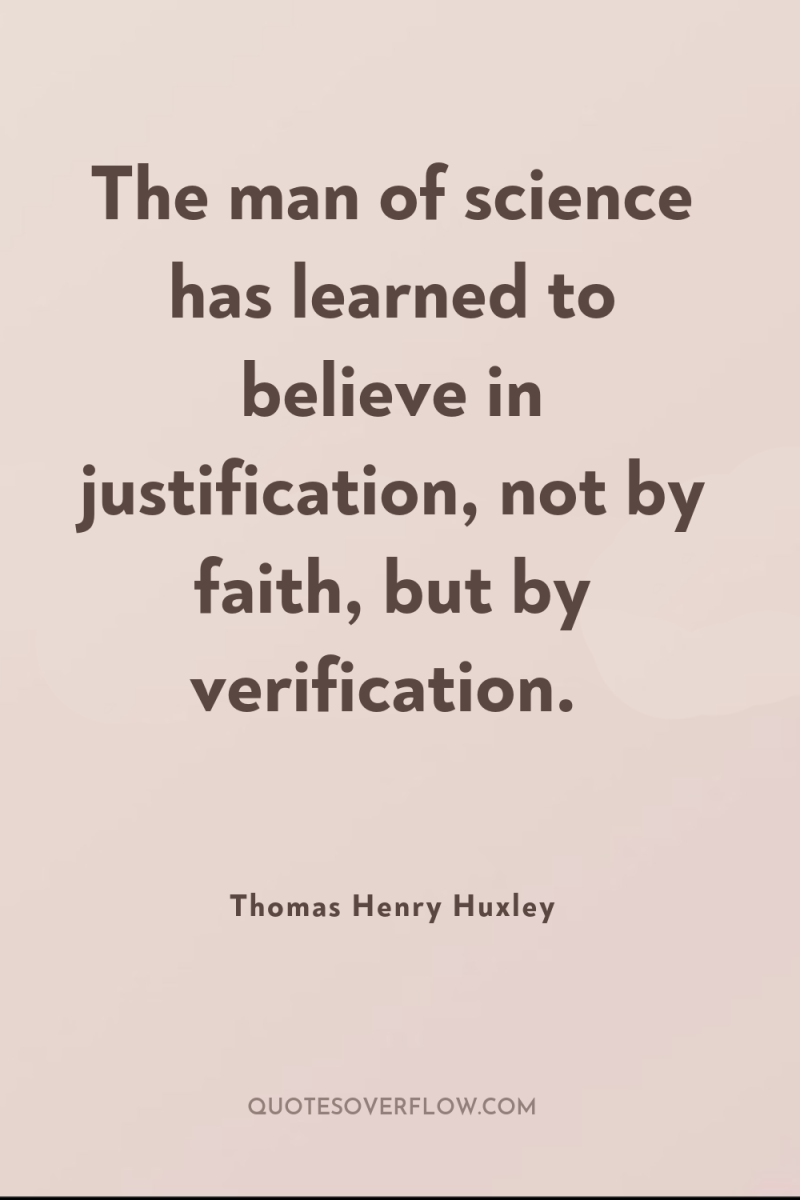
18
The man of science has learned to believe in justification, not by faith, but by verification.Thomas Henry Huxley
19
The science, the art, the jurisprudence, the chief political and social theories, of the modern world have grown out of Greece and Rome–not by favour of, but in the teeth of, the fundamental teachings of early Christianity, to which science, art, and any serious occupation with the things of this world were alike despicable.Thomas Henry Huxley
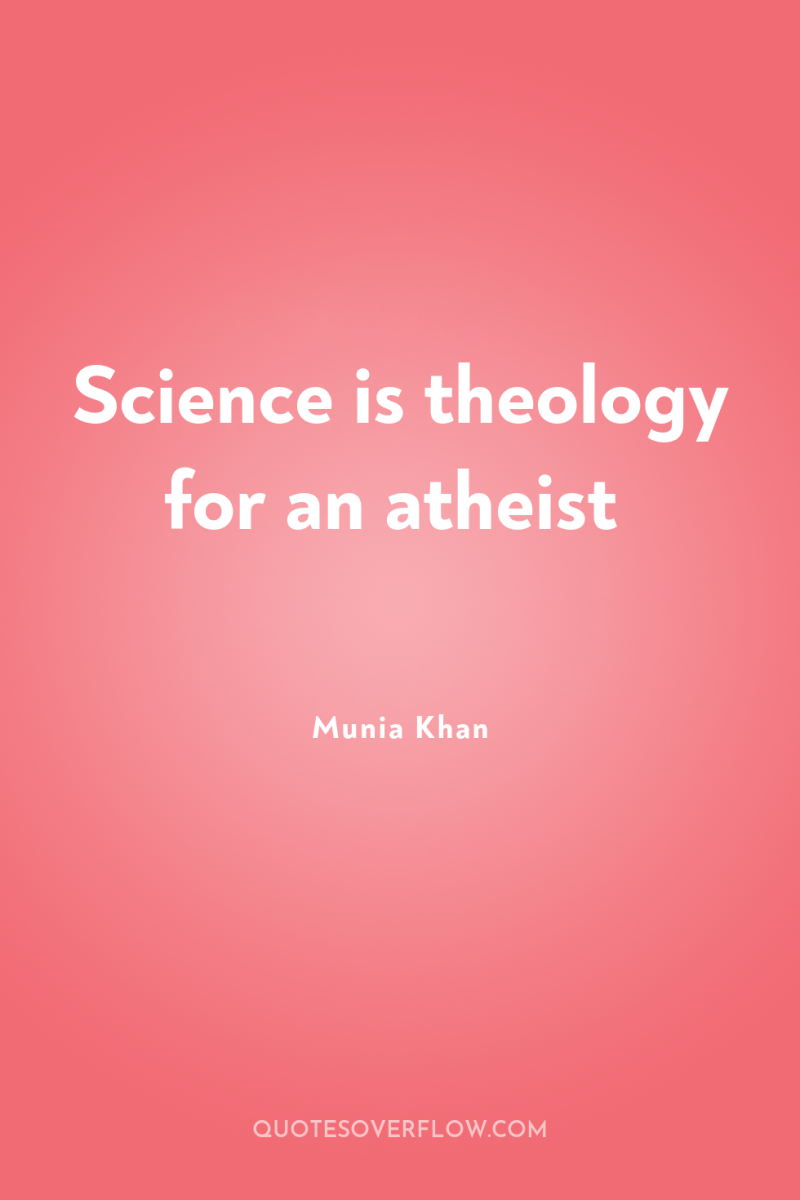
20
Science is theology for an atheistMunia Khan
21
People whom live in a world dominated by science and technology are losing belief in God and turning away from religion. Science eliminated the traditions that formerly made living an art form including the rain celebration of spring and traditional harvest festivals.Kilroy J. Oldster
22
When circumstances pour the minds of some young helpless individuals with hatred and rage towards the society, and when that pain, hatred, and rage become unbearable, they turn to the scriptures as the final resort, in a pursuit to find absolution, guided by the psychopathic, misogynistic, genocidal, pestilential, megalomaniacal, sadomasochistic, capriciously malevolent, fundamentalist preachers.Abhijit Naskar
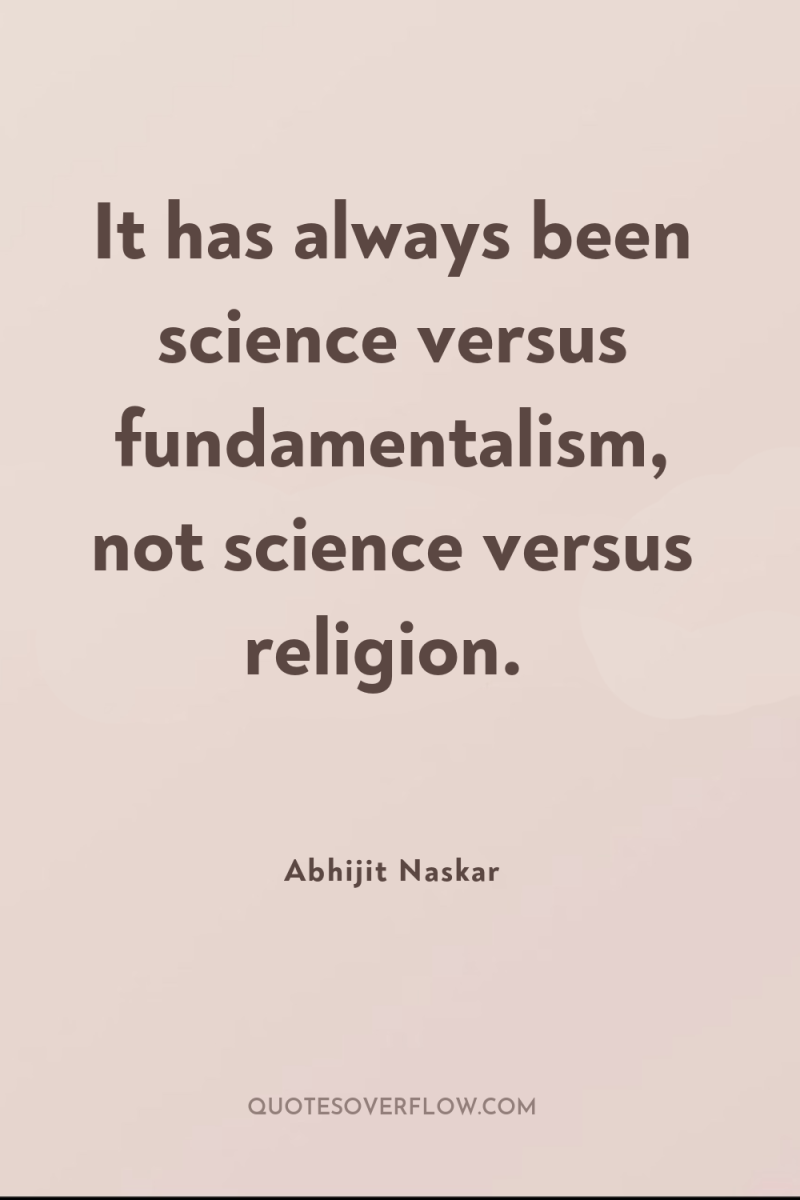
23
It has always been science versus fundamentalism, not science versus religion.Abhijit Naskar
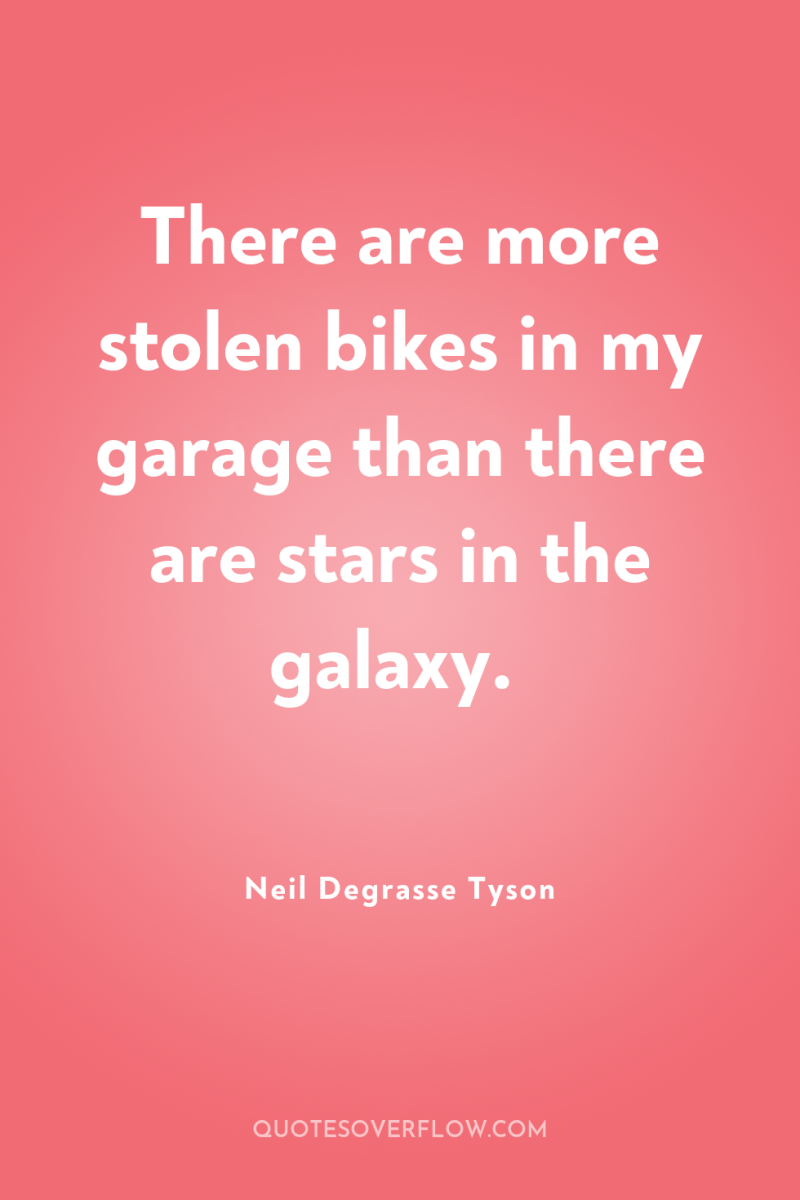
24
There are more stolen bikes in my garage than there are stars in the galaxy.Neil Degrasse Tyson
25
.. Protestantism, in its quest for 'rational knowledge' of God's purpose and for an understanding of this world, engendered its own demise, for it lent legitimacy to a secular science that in turn rejected and devalued all religious values. And in this respect, Protestantism effectively devalued or disenchanted itself, for in its attempt to prove its own intrinsic rationality through non-religious means it affirmed the value of science, and with this laid itself open to the charge of irrationalism and to attack from the outside from 'rational', secular forms of this-worldly legitimation.Nicholas Gane
26
.. With the rise of modern scientific (or 'rational') knowledge religion is, for the first time, challenged by the disparate claims of other life-orders (Lebensordnungen).. a polytheistic and disordered world of competing values and ideals.. the economic, political, aesthetic, erotic and intellectual, which, with the onset of modernity, separate out into relatively autonomous realms (the process of Eigengeseztlichkeit) with their own value-spheres (Wertsphären). .Nicholas Gane
27
But we have no [Marian] apparitions cautioning the Church against, say, accepting the delusion of an Earth-centered Universe, or warning it of complicity with Nazi Germany – two matters of considerable moral as well as historical import.. Not a single saint criticized the practice of torturing and burning “witches” and heretics. Why not? Were they unaware of what was going on? Could they not grasp its evil? And why is [the Virgin] Mary always admonishing the poor peasant to inform the authorities? Why doesn’t she admonish the authorities herself? Or the King? Or the Pope? .Carl Sagan
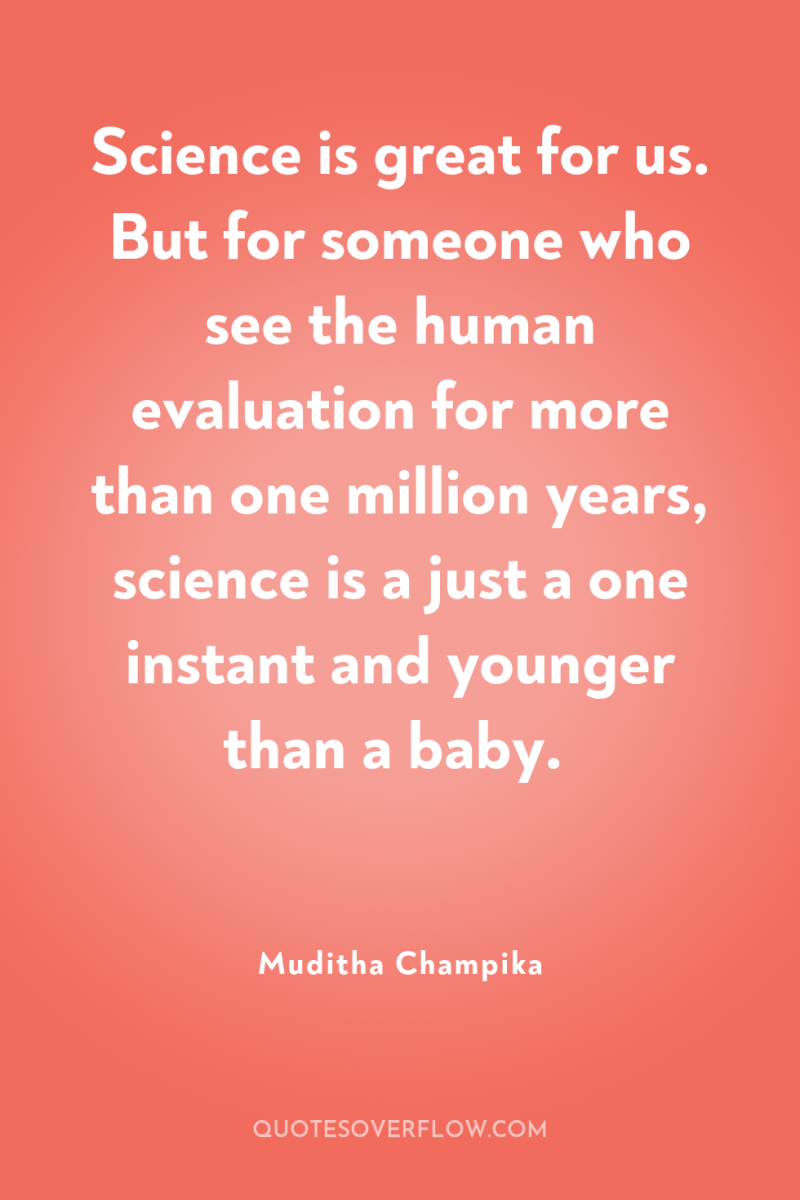
28
Science is great for us. But for someone who see the human evaluation for more than one million years, science is a just a one instant and younger than a baby.Muditha Champika
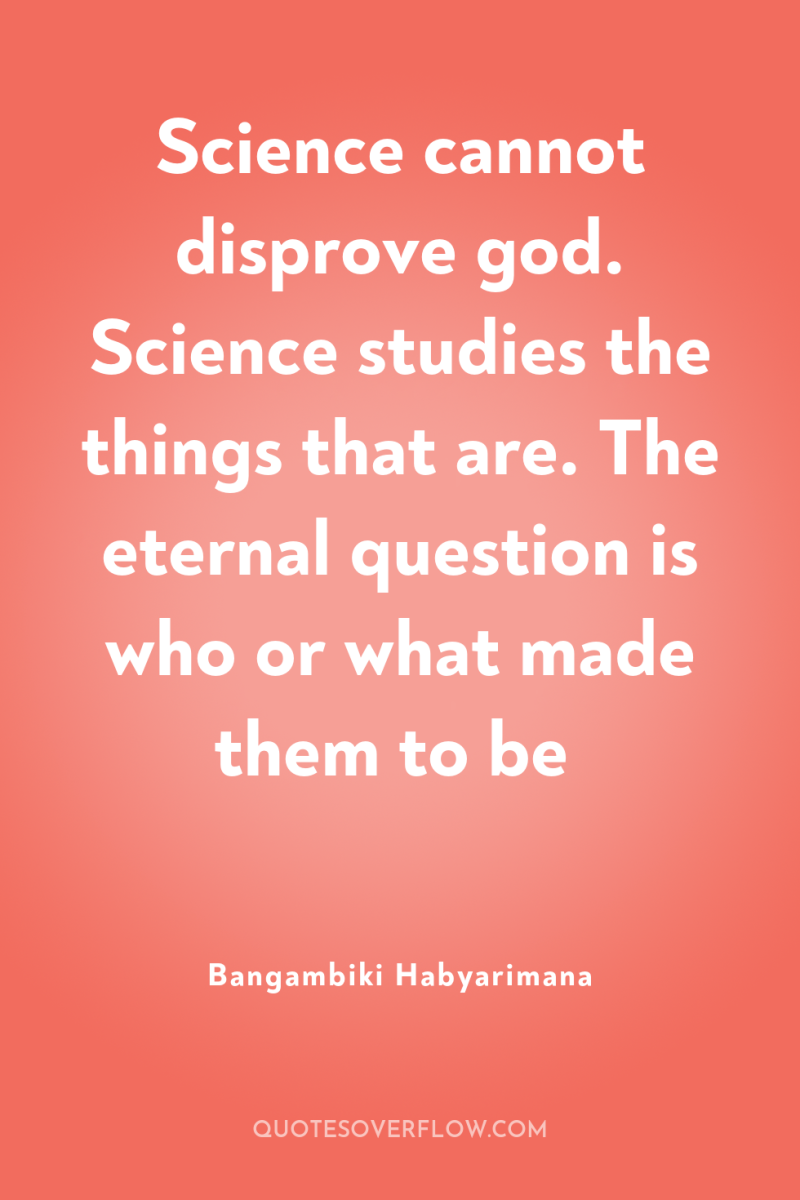
29
Science cannot disprove god. Science studies the things that are. The eternal question is who or what made them to beBangambiki Habyarimana
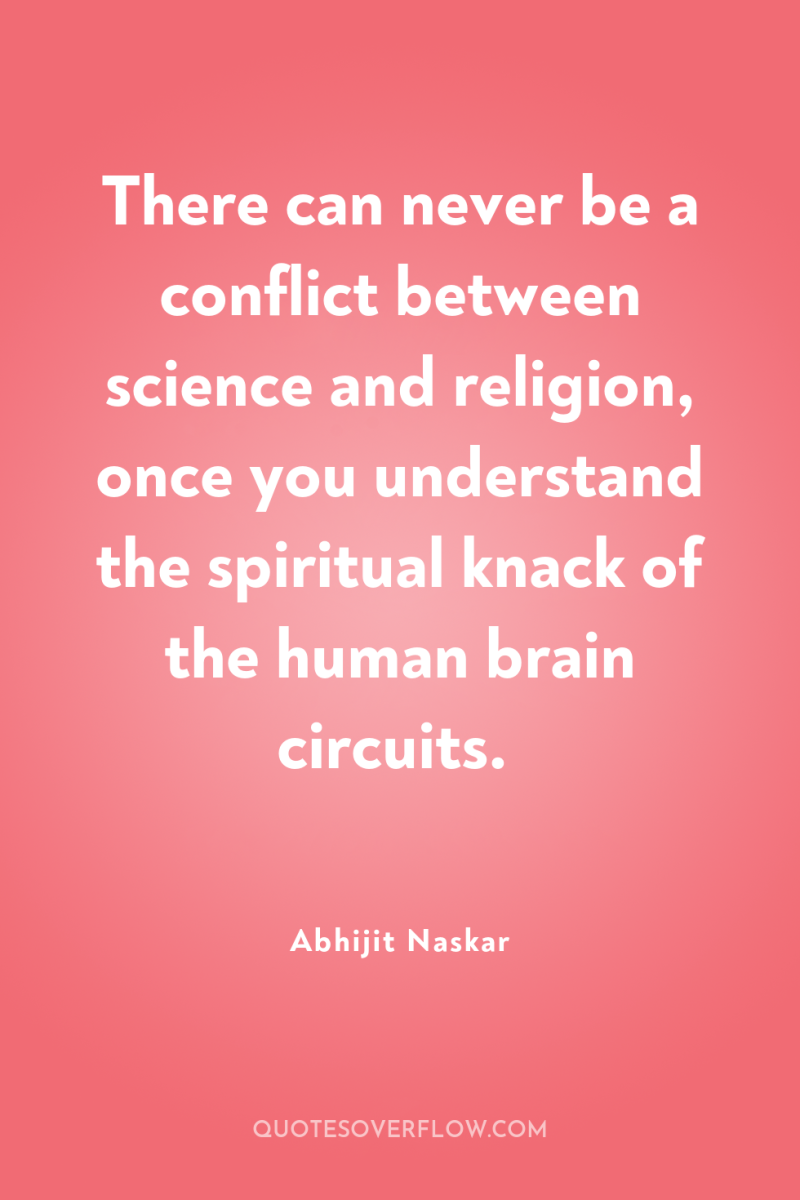
30
There can never be a conflict between science and religion, once you understand the spiritual knack of the human brain circuits.Abhijit Naskar
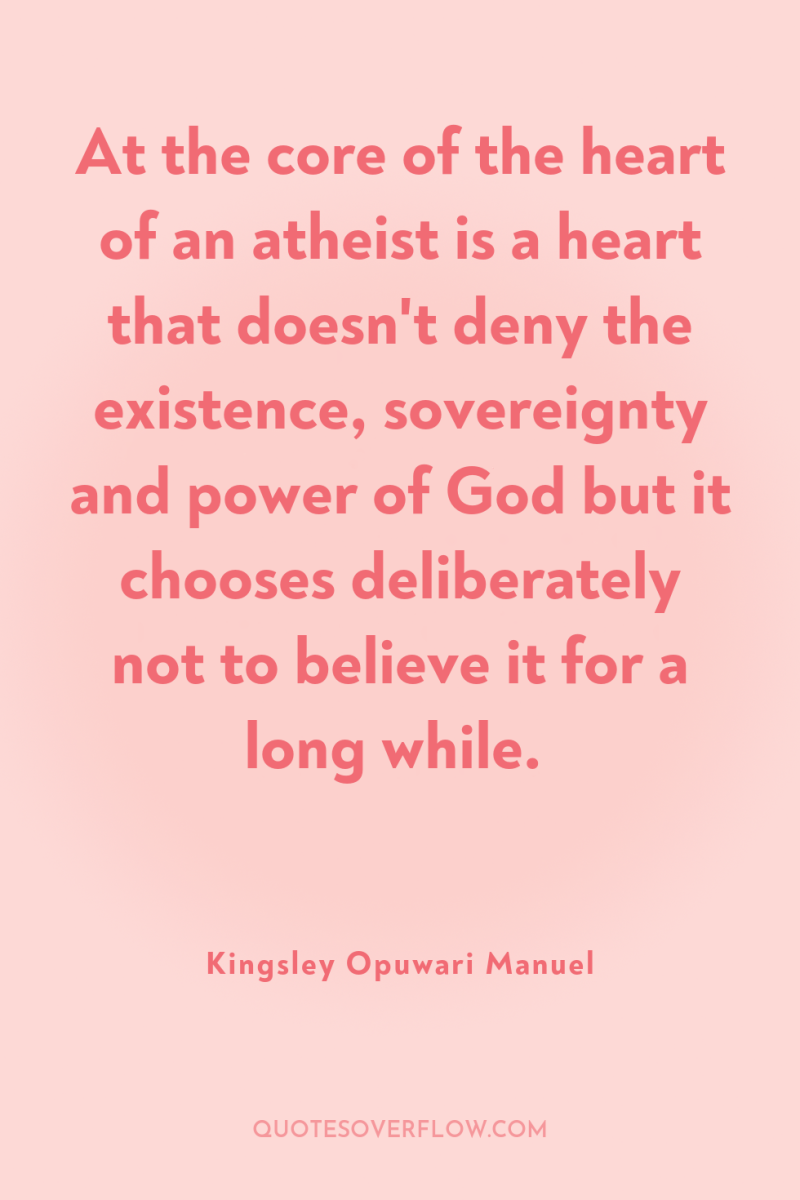
31
At the core of the heart of an atheist is a heart that doesn't deny the existence, sovereignty and power of God but it chooses deliberately not to believe it for a long while.Kingsley Opuwari Manuel
32
The history of Science is not a mere record of isolated discoveries; it is a narrative of the conflict of two contending powers, the expansive force of the human intellect on one side, and the compression arising from traditionary faith and human interests on the other.John William Draper
33
You frequently state, and in your letter you imply, that I have developed a completely one-sided outlook and look at everything in terms of science. Obviously my method of thought and reasoning is influenced by a scientific training — if that were not so my scientific training will have been a waste and a failure. But you look at science (or at least talk of it) as some sort of demoralizing invention of man, something apart from real life, and which must be cautiously guarded and kept separate from everyday existence. But science and everyday life cannot and should not be separated. Science, for me, gives a partial explanation of life. In so far as it goes, it is based on fact, experience and experiment. Your theories are those which you and many other people find easiest and pleasantest to believe, but so far as I can see, they have no foundation other than they leaf to a pleasanter view of life (and an exaggerated idea of our own importance).. I agree that faith is essential to success in life (success of any sort) but I do not accept your definition of faith, i.e. belief in life after death. In my view, all that is necessary for faith is the belief that by doing our best we shall come nearer to success and that success in our aims (the improvement of the lot of mankind, present and future) is worth attaining. Anyone able to believe in all that religion implies obviously must have such faith, but I maintain that faith in this world is perfectly possible without faith in another world… It has just occurred to me that you may raise the question of the creator. A creator of what? .. I see no reason to believe that a creator of protoplasm or primeval matter, if such there be, has any reason to be interested in our significant race in a tiny corner of the universe, and still less in us, as still more significant individuals. Again, I see no reason why the belief that we are insignificant or fortuitous should lessen our faith — as I have defined it.Rosalind Franklin
34
I know about dance, like the creationist knows about science, and typically treat it with a similar contemptEilian J. Richmond
35
There was no conflict between science and religion ever. The conflicts were actually between two different systems of human understanding — one was science, which was based on rigorous observations and examinations, and the other was fundamentalism, that’s based on undisputed belief on the scriptures.Abhijit Naskar
36
I don’t make any pretence of knowing about the existence of a Supreme Entity, neither do I make any attempt to create any friction among religions. If anything, I have spared myself no pains in my endeavor to smoothen the ongoing friction among all religions of the world.Abhijit Naskar
37
The integrity of one's own mind is of infinitely more value than adherence to any creed or system. We must choose between a dead faith belonging to the past and a living, growing ever-advancing science belonging to the future.Luther Burbank
38
You're not a piece of nothing, but the all of everything.Fakeer Ishavardas
39
We can't tell you the origin of the experience. But we can tell you the brain does appear to be built to have these [mystical] experiences. There are examples of people reaching similar states, spontaneously. But for the most part, it takes work. Meditation and these powerful prayer experiences require dedication and practice. But people have figured out how to do this, and the question is, 'What is the source of that experience?' The answer is, 'We don't know.' Science doesn't really have an answer for you.Andrew B. Newberg
40
Prayer is better than pills.Carla H. Krueger
41
Where faith commences, science ends. Both these arts of the human mind must be strictly kept apart from each other. Faith has its origin in the poetic imagination; knowledge, on the other hand, originates in the reasoning intelligence of man. Science has to pluck the blessed fruits from the tree of knowledge, unconcerned whether these conquests trench upon the poetical imaginings of faith or not. .Ernst Haeckel
42
The telescope destroyed the firmament, did away with the heaven of the New Testament, rendered the ascension of our Lord and the assumption of his Mother infinitely absurd, crumbled to chaos the gates and palaces of the New Jerusalem, and in their places gave to man a wilderness of worlds.Robert G. Ingersoll
43
To faith doubt is a sin, to science a virtue, to love a cancer and to life, suicideBangambiki Habyarimana
44
Science fiction invites the writer to grandly explore alternative worlds and pose questions about meaning and destiny. Inventing plausible new realities is what the genre is all about. One starts from a hypothesis and then builds out the logic, adding detail and incident to give substance to imaginary structures. In that respect, science fiction and theology have much in common.Lawrence Wright
45
If today you can take a thing like evolution and make it a crime to teach it in the public school, tomorrow you can make it a crime to teach it in the private schools, and the next year you can make it a crime to teach it to the hustings or in the church. At the next session you may ban books and the newspapers. Soon you may set Catholic against Protestant and Protestant against Protestant, and try to foist your own religion upon the minds of men. If you can do one you can do the other. Ignorance and fanaticism is ever busy and needs feeding. Always it is feeding and gloating for more. Today it is the public school teachers, tomorrow the private. The next day the preachers and the lectures, the magazines, the books, the newspapers. After while, your honor, it is the setting of man against man and creed against creed until with flying banners and beating drums we are marching backward to the glorious ages of the sixteenth century when bigots lighted fagots to burn the men who dared to bring any intelligence and enlightenment and culture to the human mind.Clarence Darrow
46
To base the unexplainabilty and the immense wonder of nature onto an other miracle (God) is unnecessary and not acceptable for any serious thFritz Zwicky
47
Thus identified with astronomy, in proclaiming truths supposed to be hostile to Scripture, Geology has been denounced as the enemy of religion. The twin sisters of terrestrial and celestial physics have thus been joint-heirs of intolerance and persecution–unresisting victims in the crusade which ignorance and fanaticism are ever waging against science. When great truths are driven to make an appeal to reason, knowledge becomes criminal, and philosophers martyrs. Truth, however, like all moral powers, can neither be checked nor extinguished. When compressed, it but reacts the more. It crushes where it cannot expand–it burns where it is not allowed to shine. Human when originally divulged, it becomes divine when finally established. At first, the breath of a rage–at last it is the edict of a god. Endowed with such vital energy, astronomical truth has cut its way through the thick darkness of superstitious times, and, cheered by its conquests, Geology will find the same open path when it has triumphed over the less formidable obstacles of a civilized age.David Brewster
48
Too old for dolls. Too ill for tablets.Carla H. Krueger
49
Today, the theory of evolution is an accepted fact for everyone but a fundamentalist minority, whose objections are based not on reasoning but on doctrinaire adherence to religious principles.James D. Watson
50
The existence of a limit to science is, however, made clear by its inability to answer childlike elementary questions having to do with first and last things — questions such as “How did everything begin?” “What are we all here for?” “What is the point of living?Sir Peter Medawar
51
BioLogos claims there is no conflict between the theory of evolution and creationism. Huh? Here is where the creationists seem to have the intellectual advantage: they at least see the conflict. Actually, it is not that BioLogos isn't aware of the conflict, but rather, it has come up with the answer to the long-standing conflict between Darwinism and creationism: simply pretend there is no conflict.G.M. Jackson
52
Scientists gladly accept any new truth demonstrated by evidence, that is, proved by the very law of the cosmos. Not so with any new conceptions of religion; these are fought by the use of persecution and venom. Many of the current religious beliefs literally carried into practice would stampede humanity into the old jungle ideas and habits.Luther Burbank
53
They say that Caliph Omar, when consulted about what had to be done with the library of Alexandria, answered as follows: 'If the books of this library contain matters opposed to the Koran, they are bad and must be burned. If they contain only the doctrine of the Koran, burn them anyway, for they are superfluous.' Our learned men have cited this reasoning as the height of absurdity. However, suppose Gregory the Great was there instead of Omar and the Gospel instead of the Koran. The library would still have been burned, and that might well have been the finest moment in the life of this illustrious pontiff. .JeanJacques Rousseau
54
..Turn our thoughts, in the next place, to the characters of learned men. The priesthood have, in all ancient nations, nearly monopolized learning. Read over again all the accounts we have of Hindoos, Chaldeans, Persians, Greeks, Romans, Celts, Teutons, we shall find that priests had all the knowledge, and really governed all mankind. Examine Mahometanism, trace Christianity from its first promulgation; knowledge has been almost exclusively confined to the clergy. And, even since the Reformation, when or where has existed a Protestant or dissenting sect who would tolerate a free inquiry? The blackest billingsgate, the most ungentlemanly insolence, the most yahooish brutality is patiently endured, countenanced, propagated, and applauded. But touch a solemn truth in collision with a dogma of a sect, though capable of the clearest proof, and you will soon find you have disturbed a nest, and the hornets will swarm about your legs and hands, and fly into your face and .John Adams
55
Think of how many religions attempt to validate themselves with prophecy. Think of how many people rely on these prophecies, however vague, however unfulfilled, to support or prop up their beliefs. Yet has there ever been a religion with the prophetic accuracy and reliability of science? ... No other human institution comes close.Carl Sagan
56
Do something from nothing for nothing is nothing unless it is made something. There is always something common with something and nothing and that is the 'thingErnest Agyemang Yeboah
57
Even if god was proved beyond doubt that he did not exist. We would still believe in him. We don't need hard facts, we need true emotions.Bangambiki Habyarimana
58
Science does not need religion. Religion does not need science. And the twain shall never meetBangambiki Habyarimana
59
I love theologians, they know god cannot speak so they spend their energy trying to explain to us what his silence meansBangambiki Habyarimana
60
Scientific Religion is compatible with Science and in fact, they enrich each other. That's because scientific religion is simply the realization of divinity within one's heart. Therefore, Science and Scientific Religion smoothen each other's path of progress. While on the contrary, far from being compatible with Science, Theoretical Religion consistently tries to impede the development of human society. Moreover, being rigidly based on bookish doctrines, it keeps making efforts to drag the human society back to the Stone Age.I am afraid, if you don't act now, the relentless battle between Theoretical Religions will turn this beautiful planet which we call home, into a barren wasteland.Abhijit Naskar
61
I am proud to say to you that, I am a scientist and I accept all religions to be biologically true and equal. My pursuit of understanding the human mind has taught me universal tolerance.Abhijit Naskar
62
By believing in an imaginary invisible supernatural entity, humans may become good citizens. But this is not religion. This is merely an illusion of religion.Abhijit Naskar
63
Why then you're as mad as me. No, madder. For I distrust 'reality' and its moron mother, the universe, while you fasten your innocence to fallible devices which pretend at happy endings.Ray Bradbury
64
What do you think science is? There's nothing magical about science. It is simply a systematic way for carefully and thoroughly observing nature and using consistent logic to evaluate results. Which part of that exactly do you disagree with? Do you disagree with being thorough? Using careful observation? Being systematic? Or using consistent logic?Steven Novella
65
As for karma itself, it is apparently only that which binds "jiva" (sentience, life, spirit, etc.) with "ajiva" (the lifeless, material aspect of this world) - perhaps not unlike that which science seeks to bind energy with mass (if I understand either concept correctly). But it is only through asceticism that one might shed his predestined karmic allotment. I suppose this is what I still don't quite understand in any of these shramanic philosophies, though - their end-game. Their "moksha", or "mukti", or "samsara". This oneness/emptiness, liberation/ transcendence of karma/ajiva, of rebirth and ego - of "the self", of life, of everything. How exactly would this state differ from any standard, scientific definition of death? Plain old death. Or, at most, if any experience remains, from what might be more commonly imagined/feared to be death - some dark perpetual existence of paralyzed, semi-conscious nothingness. An incessant dreamless sleep from which one never wakes? They all assure you, of course, that this will be no condition of endless torment, but rather one of "eternal bliss". Inexplicable, incommunicable "bliss", mind you, but "bliss" nonetheless. So many in the realm of science, too, seem to propagate a notion of "bliss" - only here, in this world, with the universe being some great amusement park of non-stop "wonder" and "discovery". Any truly scientific, unbiased examination of their "discoveries", though, only ever seems to reveal a world that simply just "is" - where "wonder" is merely a euphemism for ignorance, and learning is its own reward because, frankly, nothing else ever could be. Still, the scientist seeks to conquer this ignorance, even though his very happiness depends on it - offering only some pale vision of eternal dumbfoundedness, and endless hollow surprises. The shramana, on the other hand, offers total knowledge of this hollowness, all at once - renouncing any form of happiness or pleasure, here, to seek some other ultimate, unknowable "bliss", off in the beyond.. .Mark X.
66
The visage of Lucifer mushroomed into hideousness above the cloudbank, rising slowly like some titan climbing to its feet after ages of imprisonment in the Earth.Unknown